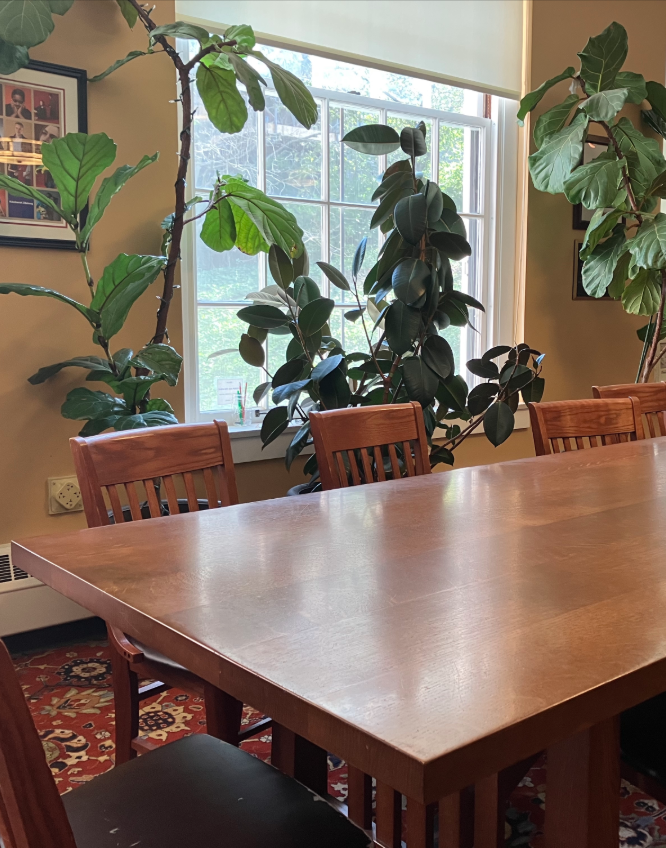For Amherst College’s fourth annual LitFest, The Common put together a Literary Landmarks tour of Amherst College, highlighting locations on campus with special connections to literary figures affiliated with the college, from Robert Frost to Lauren Groff. Building on that effort, we’ve compiled these highlights from The Common that were written either by or about Amherst professors, alums, and even current students.
The Poet in Rome: Richard Wilbur in Postwar Italy by Robert Bagg
Richard Wilbur graduated from Amherst College in 1942, and returned to Amherst to teach towards the end of his life, from 2008 to 2014.
“Richard Wilbur first visited Rome with the American Fifth Army that liberated the city, just behind the fleeing Germans, on 5 June 1944. By 10:00 p.m., his division, the 36th Texans, in trucks, in jeeps, and on mobile artillery, followed the tanks of the First Armored Division into the southern outskirts of Rome, where it paused, expecting to camp and rest within Cinecittà—then, as now, the sprawling center of Italy’s movie industry. Ever the explorer, Wilbur wandered into an abandoned viewing room and found, already loaded into an editing machine, a costume drama set in the Roman Empire. He turned the hand crank and watched a Fascist version of ancient history until his disgust overcame his curiosity.”
Brown Road (1853-1932) by Ted Conover
 Ted Conover graduated from Amherst College in 1980.
Ted Conover graduated from Amherst College in 1980.
“If it weren’t for the detailed map in my hands—a page of the New Hampshire Atlas and Gazetteer, from DeLorme, with the small state divided up into more than thirty spreads—I’d have had no idea that a road existed here, half a mile from our house. And in fact, the atlas has oversold it: Brown Road does exist, but not in a condition where you could drive a car or even an SUV down it. Nor a mountain bike, unless you were hardcore and could lift it over fallen trees, slide it under branches, and skirt some soggy bogs.”
Ann Arbor Diptych by Avery Farmer
 Avery Farmer is a current student at Amherst College and an intern with The Common.
Avery Farmer is a current student at Amherst College and an intern with The Common.
“Soccer becomes a home for people. A momentary higher calling. When you step onto the grass, or when you crowd into the stands with a rowdy, loving group of supporters, you are elevated. You become more than one person with personal traumas and aspirations; you are a part of a massive, moving thing, greater than the individual game you’re playing in or watching; greater, even, than all the games being played and watched at any given time, because soccer is a ritual that the whole world shares.”
Exquisite Corpse by Lauren Groff
Lauren Groff graduated from Amherst College in 2001.
In addition to contributing fiction to The Common, Groff gave an interview in 2015.
“We can’t always choose what we love, or what we can’t love. All my life I have been surrounded by people who would have loved otherwise, if they could: my mother who loved my father, my father who loved the red-haired woman, my uncles who loved their mother, Flo. My wife. Me. When I began to make money, a lot of it, I protested that I didn’t love it, I loved the life that came with money, I loved the good I could do with it, I loved the color and vibrancy and music that it brought into the world. In the end, in that small gray prison cell, the only music my heart’s slick swish in my ears, I realized how wrong I was.”
Journals in Ice by Kelle Groom
 James Merrill graduated from Amherst College in 1947.
James Merrill graduated from Amherst College in 1947.
“The house, a late-Victorian, is where Merrill and his partner, the writer David Jackson, lived for 40 years. He and David contacted spirits at the round, milk glass table in the scarlet-pink room in the Merrill apartment. Here, he wrote the 17,000-line epic, The Changing Light at Sandover, from séances with the Ouija board. He transcribed these sessions with otherworldly spirits, creating a 560-page trilogy of poems. Merrill called the spirits to this room for decades.”
Keeping Perspective: An Interview with Jeff Holmes by Nayereh Doosti
 Jeff Holmes graduated from Amherst College in 2012.
Jeff Holmes graduated from Amherst College in 2012.
“Hip hop was the soundtrack to the lives of me and my friends. So for that not to be present in the stories, it would have been a great injustice. And I think hip hop as a genre and as a literary form is finally starting to get its day in the sun. There is a class at Harvard, and 9th Wonder the producer teaches as a professor, I’m not sure where. Nas is also a fellow at Harvard. People are starting to recognize it as the literary genre that it is. I would love to see more writers embrace that. I think a lot of writers who come from my background, and even those who don’t, find it very influential as an American art form. It was the first narrative I engaged with that made me feel like I had a voice.”
Horizontal Feminists: An Interview with Alexander Chee by Julia Lichtblau
 Alexander Chee was a visiting writer at Amherst College.
Alexander Chee was a visiting writer at Amherst College.
“After I left college, I went out to San Francisco, where I met a good number of sex workers who became very good friends of mine. At one point, I did makeup for gay pornography films for extra cash. I was also a go-go boy. So you could say I was a citizen of the San Francisco demi-monde. If I hadn’t had literary ambitions that were larger than the literary culture of San Francisco at the time, in terms of wanting to work in publishing and magazines, I probably would have stayed. It was the kind of freedom you can have when you agree to not even try to be the thing that the culture wants from you.”
The Old Apartment by Isabel Meyers
Isabel Meyers is a current student at Amherst College, and an intern with The Common.
“It took years for me to feel like I was no longer living in her shadow. Summer before junior year of high school, after Rosa had left for Brazil, I attended my first creative writing workshop and began drafting, for the first time I can remember, a voice distinct from hers, paragraph by paragraph. It was only after I attended more writing workshops, and she ventured deeper into theater, that I really considered us individuals and at last creative equals. Today though, I hang onto her every word when she translates the world around us, and onto her arm when she guides me through packed bus terminals.”
Dread by Julia Pike
 Julia Pike is a current student at Amherst College and the Thomas E. Wood ’61 Fellow at The Common. In addition to the essay featured here, she contributed a dispatch in 2017.
Julia Pike is a current student at Amherst College and the Thomas E. Wood ’61 Fellow at The Common. In addition to the essay featured here, she contributed a dispatch in 2017.
“That year, my first Massachusetts winter, January oozed into February and I stopped wanting to look out the window. I forgot to notice how the sun washed the sky pastel as it rose, noticing only the way it faded the mountains to bruise-colors as it set. The things that used to make me happy no longer stuck, moments of beauty slipping off my psyche like pearls of water off a duck’s back. The darkness made me weepy and ineffectual, and a fog settled in me that would stick around until August, lifting just as my sophomore year began.
I inherited my grandfather’s sadness, his love of drawing, his long limbs. His awareness of all the things beyond his control, the things that loomed.”
Talmudic Lesson: God’s Smile by Ilan Stavans
Ilan Stavans is the Lewis-Sebring Professor in Latin American and Latino Culture at Amherst College. In addition to contributing essays, he has translated several poems that appear in The Common.
 “Why are the two stories of Rebekah and Rabbi Eliezer so devastating? And why can’t I get over them? Because they tell us that no matter how humble or how dignified we pretend to be, it is impossible—even for God—not to get enmeshed in the dirty business of life. And life is indeed dirty, made of an infinite number of occasions on which, no matter how objective, how impartial we want to be, our actions will have reverberations—they will affect others in unforeseen ways. Because, in essence, avoiding taking sides is an ideal repeatedly betrayed. The act of living is, in and of itself, a way of taking sides. Because Rebekah, one of the four biblical matriarchs, is shameful in her action. But so is God. And if God isn’t above the fray, who will be?”
“Why are the two stories of Rebekah and Rabbi Eliezer so devastating? And why can’t I get over them? Because they tell us that no matter how humble or how dignified we pretend to be, it is impossible—even for God—not to get enmeshed in the dirty business of life. And life is indeed dirty, made of an infinite number of occasions on which, no matter how objective, how impartial we want to be, our actions will have reverberations—they will affect others in unforeseen ways. Because, in essence, avoiding taking sides is an ideal repeatedly betrayed. The act of living is, in and of itself, a way of taking sides. Because Rebekah, one of the four biblical matriarchs, is shameful in her action. But so is God. And if God isn’t above the fray, who will be?”
From The Study of Animal Languages by Lindsay Stern
 Lindsay Stern graduated from Amherst College, where she interned at The Common, in 2013.
Lindsay Stern graduated from Amherst College, where she interned at The Common, in 2013.
“’First for school to end’, he interrupts. ‘Then for my twenties, then for success. Marriage, children, et cetera. For them to leave. For their children. Then the waiting became less conspicuous. Waiting for the cry of boiled water. For the paper. For spring. It took a mighty long time to understand that what I’d been waiting for wasn’t each thing, actually, but the chance to wait for whatever came next.’”






